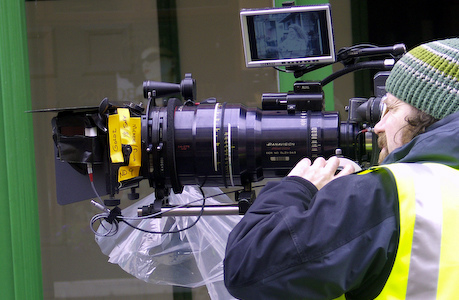 Apparently, my son is not autistic enough to qualify for television documentary stardom.
Apparently, my son is not autistic enough to qualify for television documentary stardom.
Several months ago, we were approached by the producers of a television documentary series. They were planning a program about whether or not there was some kind of environmental link to autism, and they wanted to get footage of families living with autism. I exchanged a few emails with the producers, and eventually they came to our home to meet us and see George.
We were perfectly happy to be a part of this. We are strong on autism advocacy and awareness, and we take any opportunity we can to help spread the word about the realities of autism – both the challenges faced and the potential for achievement.
When the producers came to see us, something about their approach to the conversation raised a red flag to us. We got the sense that they were trying to push one side of a particular autism debate without giving any airtime to the other side. What the debate is and what side of the fence we fell on is not relevant. Our issue was with the integrity of the whole thing. It just seemed to us that the agenda behind this documentary was to sensationalize an aspect of autism.
But we kept an open mind. Maybe we were reading this wrong, and just needed more context. After the meeting, we sent the producers on their way and waited for them to get in touch with us.
About three weeks passed with no contact apart from a couple of basic “we’ll be in touch soon” emails. Eventually, I got a message from one of the producers, telling us that George was “not autistic enough” to be included in the program. Apparently, they were looking for a child with very severe autism – one who is completely non-verbal and very low-functioning – so that they could better “demonstrate the challenges of a typical autism family.”
Herein lies my issue: there is no such thing as a “typical autism family”. Autism manifests in so many different ways. There are kids who are fully verbal but go into meltdown when someone tries to touch them. Then there are kids – like my George – who hardly talk at all, but who love to be hugged and cuddled. Some kids are academically sound and socially weak, others have some social skills but do not perform academically. There are kids who excel in math, music, art, or any number of other things, and there are some who don’t. There are the kids with sensory processing issues and the kids without. There are so many elements of autism, and they can be combined in an infinite number of ways, with varying degrees of intensity.
With all of this variation, how can a couple of producers, neither of whom has had any prior personal experience with autism, talk about a “typical autism family”? Every family with a child autism has its own very unique, individual challenges to deal with, and I worry about the media showing only one side of it and calling it “typical”. That, to me, is disrespectful and unfair to the vast majority who are not represented.
The way I see it, our initial reservations had merit: the producers want to sensationalize autism. They want to show only the negative, challenging, heartbreaking aspects of it, and give no airtime to the possibilities, the potential, and the idea that people with autism can and do make valuable contributions to society. They want to profile a theory – a theory, mind you – about what might cause autism in some kids – and present it as something that is relevant to all kids.
I don’t think this kind of reporting does any favours to anyone. Not the families who have to live with autism. Not the public, who are not being informed about autism in a fair, unbiased way. And certainly not the kids themselves, who are being portrayed in a way that is only accurate for a few of them.
I am quite happy for my family to not be the vehicle for that kind of media sensationalism.
(Photo credit: http://www.flickr.com/photos/16961193@N06/2887772100/)









